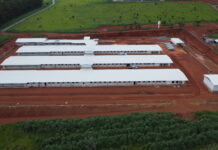Zimbabwe will import 400,000 tonnes of white maize from neighbouring Zambia and Malawi, the Grain Millers Association of Zimbabwe (GMAZ) has said.
The imports follow reduced harvests recorded this year blamed on erratic rains.
Zimbabwe has been facing food insecurity since 2000 when the government led by the now late Robert Mugabe, seized white-owned farms and replaced them with thousands of indigenous farmers who are failing to meet the past growing targets.
Zimbabwe has also endured frequent droughts over the years, with conditions expected to worsen as temperatures rise due to climate change.
The government has forecast maize production for the 2021/22 season at 1.56 million tonnes, down from the previous season’s record of 2.72 million tonnes.
The country requires 2.2 million tonnes annually for human and livestock consumption and the government has encouraged private millers and producers of livestock feed to import some grain to plug the deficit.
“I am pleased to inform the nation that GMAZ has secured 400,000 metric tonnes of white maize from Malawi and Zambia,” GMAZ chairperson Tafadzwa Musarara said in a statement this week.
He said Zimbabwe expects to start receiving the maize from the end of June adding the decision was timely as it would enable the country to meet its national food security needs in light of the geo-politics in the grain farming regions of Eastern Europe.
Zimbabwe’s millers have been increasing prices, citing higher import and production costs.
In March, millers increased maize meal and wheat flour prices by 15%, followed by further hikes of 52% and 31% for maize meal and wheat flour, respectively, in April.
Food price inflation has worsened the challenges of a country battling to recover from an extended economic crisis, which was exacerbated by Covid-19 and the rapid devaluation of a local currency reintroduced in 2019.
Zimbabwe, which suffered 500 billion percent hyperinflation in December 2008 according to the International Monetary Fund, is experiencing another phase of rapid price increases, with year-on-year inflation rising to 131.7% in May, up from 60.6% in January.








